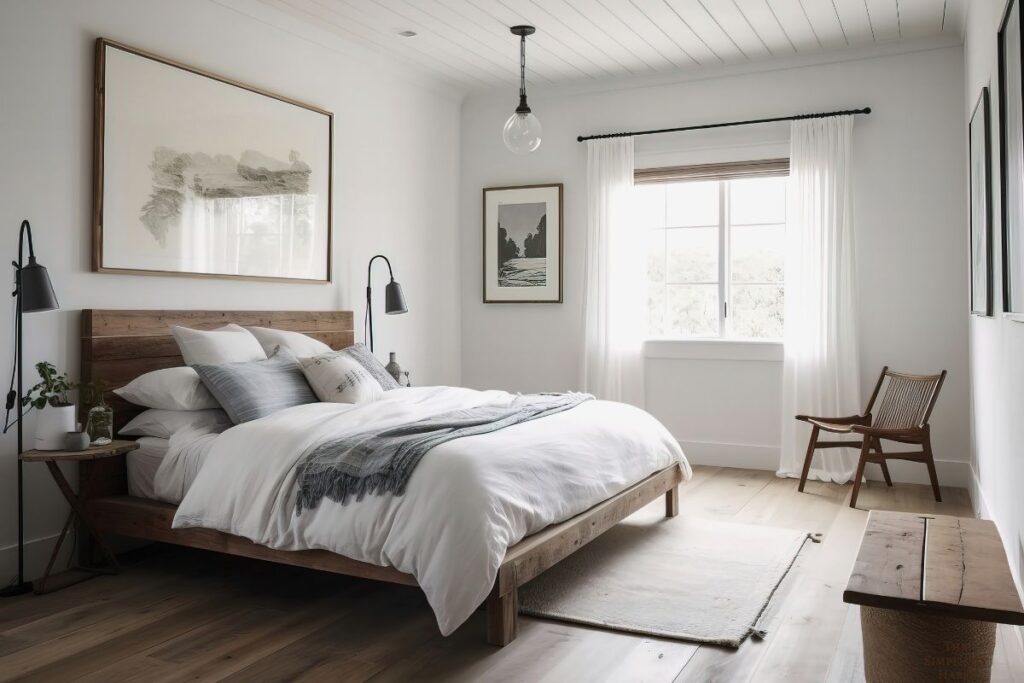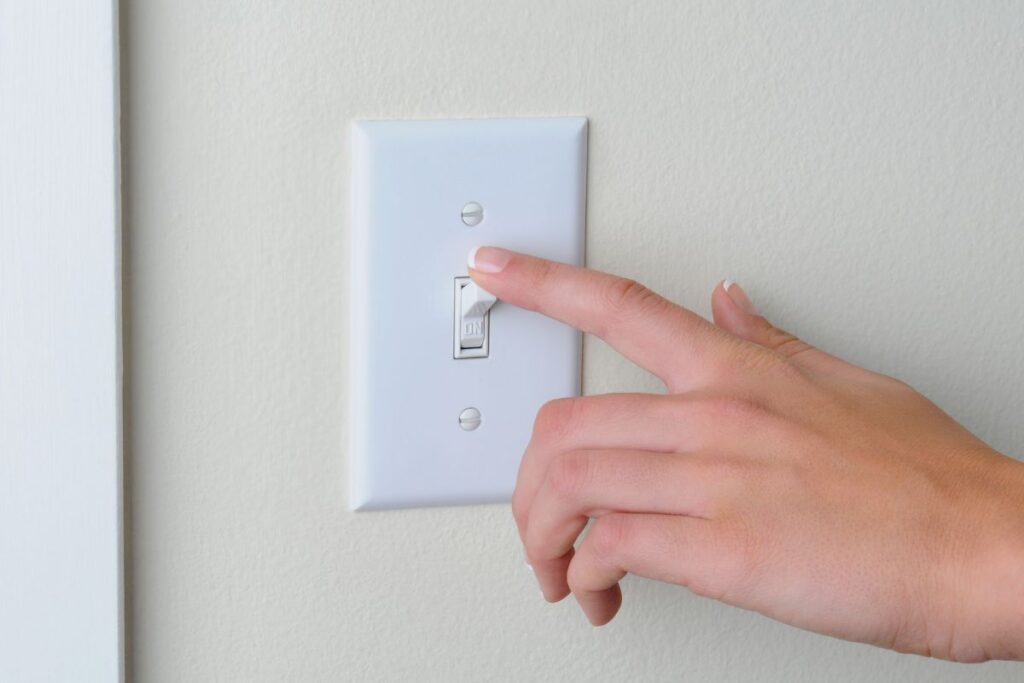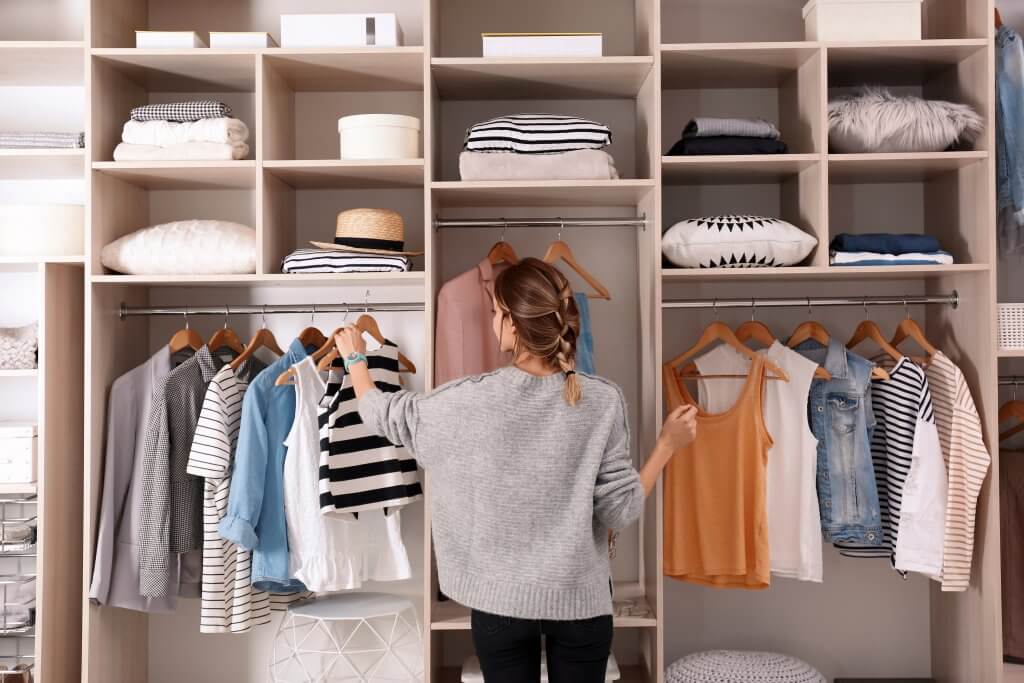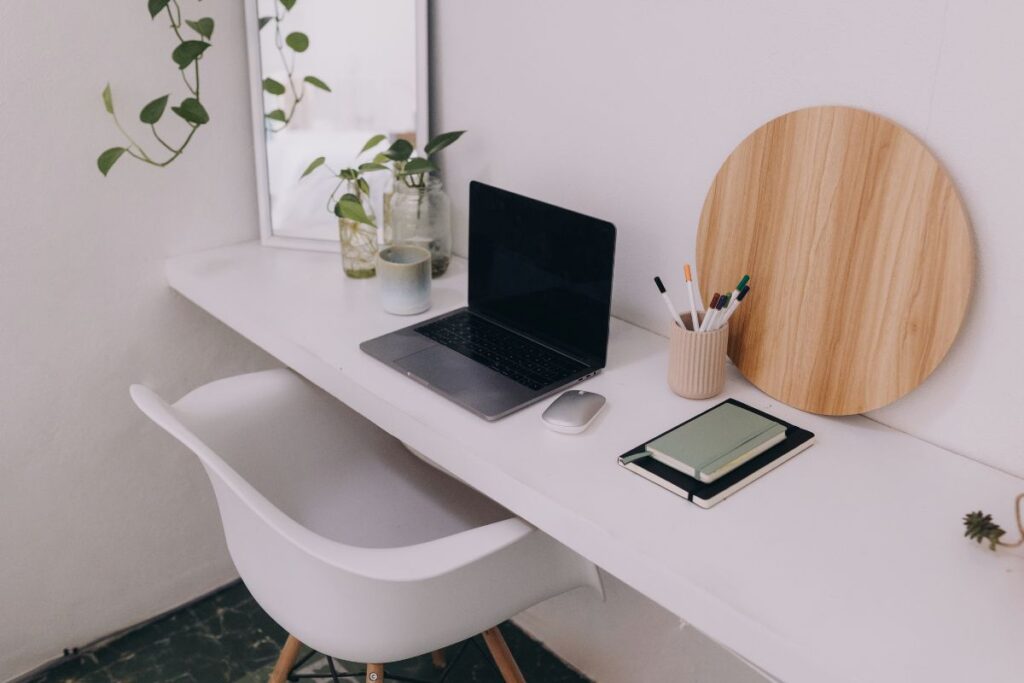Inside: Use these daily habits to embrace a minimalist lifestyle. They’ll help you save money and keep your home clutter-free.
A guest post by Cora Gold
“Getting rid of everything that doesn’t matter allows you to remember who you are. Simplicity doesn’t change who you are, it brings you back to who you are.” ~Courtney Carver
There is joy to be found in choosing to live simply. When the excess is removed, you’re able to get clear on your priorities and free yourself up for the things you love.
Whether you’re already on a journey to become more minimalist or you’re simply feeling overwhelmed with too many things, you can make changes to help you reach your goals.
By taking small steps toward living a more minimalist lifestyle, you’ll find yourself feeling lighter and freer.
When you remove the weight of heavy worldly possessions and entanglements you can rediscover the miracles the simplest things in life offer. Use these simple daily habits to embrace a more minimalist lifestyle.

Why Embrace Minimalism?
Minimalism isn’t about living in an all-white space and denying yourself of everything you love. Rather, it’s about learning to be selective and creating space for the things that are most important to you.
There are many benefits to be experienced from living more simply including decreasing stress and saving you money.
Adopting a minimalist lifestyle has many perks for your mental health, as well including:
- Improved mood
- Increased focus and productivity
- Greater financial security
- Lower levels of loneliness
- Better sense of well-being
Many lifestyles that benefit human health are also good for the planet and minimalism is no exception. Conspicuous consumption has negatively impacted the environment, and simple living seeks to make better choices.
Sustainability and minimalism go hand in hand and adopting certain habits can help you to embrace a more minimalist lifestyle. Discover greater alignment by more carefully considering your decisions and the impact they have.

13 Simple Daily Habits to Embrace a More Minimalist Lifestyle
Not sure how to start to live like a minimalist? These 13 simple daily habit changes will help you to embrace a more minimalist lifestyle as you get and keep clutter out of your home.
1. Practice “One-In, One-Out”
The one-in, one-out habit is a simple rule to reduce impulse buying and keep the inventory in your home from growing. Every time you buy something new — other than consumables like groceries and paper goods — you donate, sell, or upcycle something else.
For example, buying a new coat? See if you have an older coat you’re no longer using that you can give to a friend, family member, or thrift shop.
2. Make Lists
How many times have you stood in the store thinking, “Do I need more cereal? Are we out of milk?” A little planning goes a long way toward preventing food waste.
Write lists before shopping and check the inventory you have on hand to make sure you aren’t overbuying on something while forgetting something else. This will keep you from buying a third oregano and not having to rush to the store again at the last minute because you didn’t have pasta sauce already.
3. Clean as You Go
Tired of getting to the end of the day and having your sink and counters full of dirty dishes? The key to preventing this frustration is to clean up each mess as you go.
Developing simple daily cleaning habits will help keep your home clean. Doing these daily tasks will prevent an overwhelming scenario.
Get in the habit of running the dishwasher each evening and starting a load of laundry (and completing it) each day. Determine the optimal frequency of these tasks by the needs of your family. It could be more or less often depending on how many dishes and clothes you go through.

4. Use the 1-Minute Rule
The 1-minute rule is a simple way to battle that clutter that accumulates seemingly from nowhere. If a chore takes about a minute to do, tackle it when it first crosses your mind instead of putting it off.
For example, put up your coat and shoes when you enter the house, wash your snack plate and cup when you finish eating, and fluff cushions and fold blankets when getting up from the couch.
This is a simple, but powerful decluttering habit that will help keep your home clutter-free.
5. Try the 90-90 Rule
Deciding what to declutter can be tough, as emotions play a role. Here’s a simple rule when deciding what to toss.
Ask yourself if you have used it in the past 90 days. If that answer is no, can you think of a specific reason you might need that item in the next 90? If your response is still no, into the donation bin, it goes.

6. Master the 30-30 Rule
Here’s a fun spin on the “sleep on it” rule for being more intentional with shopping. If you see something you like that’s less than $30, force yourself to go without it for the next 30 hours.
If you’re still thinking about it in 30 hours, and you’ve decided you want or need it and have the money budgeted for it, you can buy it. In many instances, you’ll have forgotten about it.
7. Finally, Use the 20-20 Rule
Here’s another fun decluttering guideline. If an item you don’t use costs less than $20, or it would take less than $20 to reproduce it from scratch, go ahead and donate it.
Keep in mind though that not all decluttering advice works for everyone, so pick and choose your rules based on what works for your needs and situation.

8. Conserve Energy
Reducing energy use is part of minimalism. Did you forget to turn out the lights before leaving? Smart home appliances let you do so from your cellphone.
A simple power strip can also turn off multiple devices at once, saving time if you lack the cash or the desire for the latest tech.
9. Work With What You Have On Hand
Do you have random leftovers filling your fridge? Pretend you are a contestant on Food Network’s “Chopped,” in which you have to make something with whatever ingredients you’re given.
Instead of running to the store and overbuying, you can make use of what you already have.
Minimalism is about trying to make do instead of buying new when you’re able to.
10. Rethink Gift Giving
It’s a week before your spouse’s birthday, and you find yourself impulse-buying something they don’t need because you’re running out of time.
We’ve all been there, but there are a few ways you can improve your gift-giving habits:
- Give clutter-free gifts. Focus on experiences. It could be tickets to see their favorite team, dinner at a fancy restaurant, or a gift certificate to a salon.
- Shop throughout the year. This may seem counterintuitive, but it can help you avoid last-minute stress spending. If you see something you know a friend would love, buy it in advance. Just make sure to keep track of what you’ve purchased so you don’t forget what you have.
- Set limits. Decide on a price point for gifts so you won’t let your spending get out of hand.

11. Choose Some Signature Colors
Creating a minimalist wardrobe can seem tough if you figuratively — or literally — wear many hats and need different attire for various occasions.
However, sticking to one or two signature colors beyond neutrals lets you mix and match seasons, pairing a summer tee under a winter sweater without color clashing. This can give you a cohesive look without needing to add additional pieces.
12. Stick to the Bag
Take a cloth bags shopping with you. Use them as a tool on your minimalist journey.
Determine in advance how many bags you can use for your shopping trip (for grocery stores you may opt to take more than for other types of shopping).
Once your bag or bags are full, it’s time to check out and head home.
13. Learn to Say No
Saying no will help prevent getting overwhelmed and is a life skill that everyone should learn. Gracefully but firmly saying no is an important habit to have especially if you tend towards being a people-pleaser.
Your minimalist journey is the perfect place to begin practicing saying no assertively yet politely. Practice saying, “no thank you,” with friends who offer you stuff you don’t need or invite you to an event you don’t want to attend.
As you get more comfortable with saying no, it gets easier. As you learn to stand up for yourself, you’ll find that you feel less resentful than when you were taking on too many things.

Daily Habits to Embrace a Minimalist Lifestyle
Becoming a minimalist has multiple benefits. It’s better for your mental health and the planet. Best of all, it provides more free time for enjoying the important things in life.
These 13 small daily habit changes can help you start your minimalist journey and stick to your guns after the big cleanout. Reducing clutter and increasing joy means making mindful choices about how you spend your money and time.
Which daily habits to embrace a minimalist lifestyle do you plan to implement? Let us know in the comments section below.
Sign up on the form below to get weekly decluttering tips and inspiration sent straight to your inbox. You’ll also get the free 5 Areas to Declutter in 10 Minutes Checklist to help you get started decluttering today.



Hey Rose,
I was truly inspired by your post on adopting daily habits for a minimalist lifestyle. It’s remarkable how simplifying one’s life can lead to such profound changes. I’ve personally found that decluttering not only my physical space but also my digital life has brought a sense of calm and focus. Unsubscribing from unnecessary emails and limiting social media usage has been liberating. It’s amazing how these small steps contribute to a larger journey towards intentionality.
Thank you for the inspiration,
Felix Positiva
Thank you. I find it fascinating to learn to say no; it truly prevents us from encountering additional troubles to solve. This doesn’t mean we’re not good people, but rather, we need to set limits to allow ourselves to rest; we’re already quite exhausted with daily tasks. I also like the idea of not over-shopping. Often, shopping becomes a habit, and I would spend until my account is empty or buy a considerable amount before stopping. This also poses financial issues, and some of the items I buy end up unused.
Great tips!
Almost 4 years ago, I retired. I took a deep breath…gave away most everything we owned, sold the house, and moved 9 hours away to be closer to grandchildren. We bought an older 34-ft Airstream that we keep on my daughter’s property and stay in when we’re ‘home’ and a 19 ft. travel van to hit the road. No regrets. I do find that in such small living quarters, having few possessions, and keeping things organized and tidy keeps us sane. With no room to store appliances, a 3 qt instant pot, a small sauce pan, a frying pan, and a toaster is all we need. We have 2 of everything, such as plates, bowls, cups, utensils that we wash immediately after meals. We each have a bin of winter and summer clothes that we keep under the Airstream. We’re enjoying a minimalist lifestyle.
I drove truck for 25 years. I learned to be a minimalist out of necessity, although I have never, myself, been into things.
Thank you. Two concepts hit – signature colors and learning to say no. Currently my wardrobe is made up of conservative clothing in neutral colors (black, navy, brown, tan/beige, and white with a few pastels thrown in). I would like to introduce brilliant color (red, cobalt blue, and lemon yellow). Outside red, these are not colors currently “in season” so are unavailable. I investigated hiring a dressmaker to make four simple linen tops and dresses, however, all seem to devote their talent exclusively to bridal wear. I’m flummoxed. Dressing outside of current trend limits choice considerably. (I’m 65 and not interested in the millennial trend of the season. It’s fun to flip through Vogue, but Rihanna and I have completely different visions for clothing our bodies.) Any suggestions?
About saying “no.” Generally I am quite good at it. I require an inordinate amount of time alone to rest and refresh. Recently, however, I’ve had a bit of a clash with a friend of 27 years. I must decide whether it’s in my best interest to move forward in what has become a superficial, lopsided friendship or gracefully exit. An event is upcoming that forces my hand soon. While I have declined attending the event (it is in my friend’s retirement party), I am still expected to take her to a swanky restaurant to celebrate. I have no such desire. Not doing so without benefit of candid conversation feels like ghosting. She deserves better than that. 27 years is nothing to sneeze at. And yet she refuses the candid conversation. Again, suggestions?